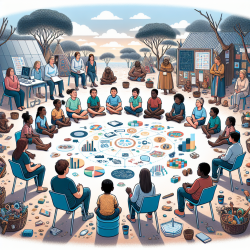Enhancing Practitioner Skills through Insights from The Picture Talk Project

The Picture Talk Project, as detailed in the research article "The Picture Talk Project: Starting a Conversation with Community Leaders on Research with Remote Aboriginal Communities of Australia," provides invaluable insights into conducting research in culturally sensitive ways. This blog aims to translate these findings into practical steps for practitioners in speech-language pathology, especially those working with diverse communities.
Key Insights from The Picture Talk Project
The Picture Talk Project emphasizes the importance of community engagement and culturally respectful research methodologies. Here are some actionable insights for practitioners:
1. Understanding and Respecting Cultural Protocols
Researchers found that respecting cultural protocols and engaging community leaders from the start is crucial. Practitioners should:
- Learn about the community's cultural norms and practices.
- Engage local leaders and stakeholders in the planning process.
- Be flexible and patient, allowing time for community members to provide feedback and consent.
2. Effective Communication Strategies
Effective communication is vital. The research highlighted the importance of using simple language and visual aids. Practitioners should:
- Use plain language and avoid jargon.
- Incorporate visual aids and storytelling techniques to explain concepts.
- Ensure that information is accessible in the community's preferred language.
3. Building Trust and Partnerships
Building trust is essential for successful outcomes. The Picture Talk Project recommends:
- Spending time in the community to build relationships before starting any intervention.
- Employing local community members as navigators or interpreters.
- Ensuring transparency and regular communication about the project's progress and findings.
4. Reciprocity and Mutual Benefit
The research underscores the importance of reciprocity. Practitioners should:
- Ensure that the community benefits from the project, whether through direct services or capacity-building initiatives.
- Share findings with the community and involve them in decision-making processes.
5. Continuous Consent Process
Obtaining consent is not a one-time event but a continuous process. Practitioners should:
- Seek community consent before individual consent.
- Regularly check in with participants to ensure they understand and agree with the ongoing process.
Encouraging Further Research
The Picture Talk Project demonstrates the value of culturally respectful research methodologies. Practitioners are encouraged to:
- Conduct further research to adapt these methodologies to other communities.
- Collaborate with local researchers and community members to ensure cultural appropriateness.
To read the original research paper, please follow this link:
The Picture Talk Project: Starting a Conversation with Community Leaders on Research with Remote Aboriginal Communities of Australia.
Citation: Fitzpatrick, E.F.M., Macdonald, G., Martiniuk, A.L.C., D’Antoine, H., Oscar, J., Carter, M., Lawford, T., & Elliott, E.J. (2017). The Picture Talk Project: Starting a Conversation with Community Leaders on Research with Remote Aboriginal Communities of Australia. BMC Medical Ethics, 18(34). https://doi.org/10.1186/s12910-017-0191-z










